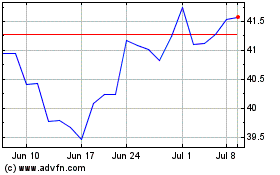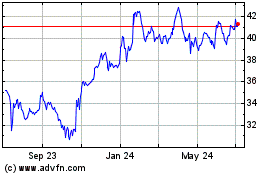Hans Vestberg is an expert in network architecture
By Sarah Krouse
This article is being republished as part of our daily
reproduction of WSJ.com articles that also appeared in the U.S.
print edition of The Wall Street Journal (June 9, 2018).
Verizon Communications Inc. named Hans Vestberg as its next
chief executive, choosing a relative newcomer to run the wireless
giant at a time when its industry is being reshaped by
megadeals.
Mr. Vestberg, who joined the company about a year ago and is its
chief technology officer, will succeed longtime CEO Lowell McAdam
on Aug. 1. Mr. McAdam will remain executive chairman until the end
of the year and then become nonexecutive chairman.
Verizon's new chief was previously the chief executive of
Ericsson AB. The 52-year-old Swede was ousted in July 2016 by the
network equipment maker's board when he was unable to halt slumping
sales and profits.
At Verizon, Mr. Vestberg will face the challenge of finding new
pockets of growth for a market leader that is losing customers to
lower-cost rivals. He will steer a business with nearly $120
billion in debt that has so far forgone a big media purchase,
though it considered deals for 21st Century Fox assets and cable-TV
firm Charter Communications Inc., The Wall Street Journal has
reported
"We feel good about the assets we have," Mr. Vestberg said in an
interview. His likely focus will be converting Verizon's network to
so-called 5G technology, holding to a strategic view that it's
better to deliver video content than create it.
Shares of Verizon have gained about 35% during Mr. McAdam's
seven-year tenure, outpacing rival AT&T Inc. but lagging far
behind the broader market. The stock was little-changed at $49 on
Friday.
Wireless rivals have turned to deals to revamp their operations
as the U.S. market matures. AT&T jumped into television by
buying DirecTV in 2015 and has a pending $85 billion deal for Time
Warner Inc. Smaller competitors T-Mobile US Inc. and Sprint Corp.
struck a $26 billion merger in April, betting regulators will allow
them to close the gap with the two bigger players.
Verizon's CEO appointment caps a multiyear succession process in
which Mr. Vestberg and company veteran John Stratton emerged as the
lead contenders. As president of global operations, Mr. Stratton,
57, oversaw most of the company's biggest units. He is no longer
running the operations and plans to retire later this year, the
company said. It didn't name a replacement.
Tim Armstrong, Verizon's top media executive, will remain in his
current role overseeing the company's Oath business, which includes
Yahoo and AOL properties. Mr. Armstrong, who was previously CEO of
AOL and a Google executive, was seen by some outside the company as
a potential successor to Mr. McAdam, but people familiar with the
matter said he wasn't considered for the CEO job,
Mr. Vestberg was "a better match for where Verizon was going to
go," Mr. McAdam said in an interview. "With 5G in front of us, we
are at a huge inflection point. Whoever is at the head of the
business should be able to see that through."
Mr. Vestberg, who spent more than 20 years at Ericsson, is an
expert in network architecture. Mr. McAdam cited his successor's
global experience at the helm of Ericsson and age as factors he and
the board considered.
The appointment surprised some investors and analysts who viewed
Mr. Stratton as the heir apparent. Past Verizon chief executives
spent years at the company, often leading several different
divisions as they rose.
Mr. McAdam said to remain competitive Verizon needed new
perspectives. The board called its mission "identifying the next
CEO for the digital world," according to a document reviewed by the
Journal.
The company Mr. Vestberg inherits is looking to shed costs while
fighting to defend its wireless-customer base of more than 116
million subscribers. In the first quarter, Verizon lost 24,000
postpaid phone connections, which are customers who pay their bill
at the end of the month and rarely switch providers.
It is also investing in a faster network, though it is unclear
how network providers will commercialize 5G. Mr. Vestberg said in
the interview that Verizon's 5G residential service is his
priority.
John Hodulik, an analyst at UBS Group AG who covers Verizon,
said Mr. Vestberg was the executive who spent the most time over
the past year talking to investors and analysts about the company's
5G-related plans. "At this point he's closer to the current focus
of the company," which is building out its network and rolling out
5G technology, Mr. Hodulik said.
Mr. McAdam, who turned 64 last month, was named CEO of Verizon
in August 2011 and at the time he told associates he only wanted to
stay five years. Over the past year he has indicated to the
company's board and analysts that he aimed to retire by his 65th
birthday.
His signature move as CEO was the $130 billion buyout in 2014 of
Vodafone Group PLC's 45% stake in Verizon Wireless. The deal, a
major contributor to Verizon's current debt, was struck arguably at
the peak of the U.S. wireless market, just months after T-Mobile
began its "un-carrier" campaign that disrupted the industry. He
later acquired Yahoo and AOL.
The former Navy engineer spent the later half of his tenure as
chief bringing in more outsiders, including Mr. Vestberg, to mix up
the backgrounds of top executives.
While the two men have known each other for about a decade
through Ericsson's role as a Verizon supplier, they spent more
personal time together as the board's process narrowed, the
executives said. Mr. McAdam went on a boat tour of some of Sweden's
archipelago with Mr. Vestberg and his wife.
Other executives the board considered in recent years included
former Telefónica UK Ltd. CEO Ronan Dunne, who has been with
Verizon since late 2016, and Marni Walden, who ran Verizon's
nascent media business and left earlier this year. Candidates met
with the board individually over the last two years, each writing a
three- to five-page exposition of their vision for the company.
Mr. Vestberg started his career at Ericsson in 1991 and rose to
the top of the company, but as its performance waned he became a
lightning rod for criticism over his compensation and his
preference for private business jets.
During his tenure, Ericsson ditched its consumer handset
business and slashed thousands of jobs as it tried to combat the
loss of sales to Huawei Technologies Co. and slowing demand in the
telecom-equipment market.
Mr. Vestberg will relocate his residence from Sweden to New
Jersey later this year.
As part of his promotion, Mr. Vestberg was given a one-time
equity award worth about $10 million in the form of performance
stock units that vest over five years. His base salary will nearly
double to $1.5 million. Last year, including stock awards, his
compensation totaled $9.8 million, while Mr. McAdam was paid about
$18 million, according to regulatory filings.
Write to Sarah Krouse at sarah.krouse@wsj.com
(END) Dow Jones Newswires
June 09, 2018 02:47 ET (06:47 GMT)
Copyright (c) 2018 Dow Jones & Company, Inc.
Verizon Communications (NYSE:VZ)
Historical Stock Chart
From Mar 2024 to Apr 2024

Verizon Communications (NYSE:VZ)
Historical Stock Chart
From Apr 2023 to Apr 2024
